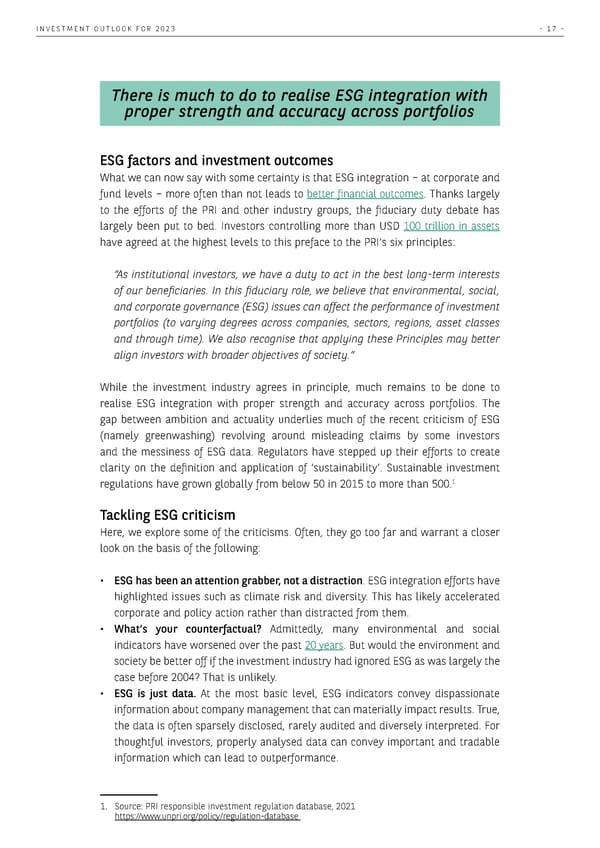INVESTMENT OUTLOOK FOR 2023 - 17 - There is much to do to realise ESG integration with proper strength and accuracy across portfolios ESG factors and investment outcomes What we can now say with some certainty is that ESG integration – at corporate and fund levels – more often than not leads to better financial outcomes. Thanks largely to the efforts of the PRI and other industry groups, the fiduciary duty debate has largely been put to bed. Investors controlling more than USD 100 trillion in assets have agreed at the highest levels to this preface to the PRI’s six principles: “As institutional investors, we have a duty to act in the best long-term interests of our beneficiaries. In this fiduciary role, we believe that environmental, social, and corporate governance (ESG) issues can affect the performance of investment portfolios (to varying degrees across companies, sectors, regions, asset classes and through time). We also recognise that applying these Principles may better align investors with broader objectives of society.” While the investment industry agrees in principle, much remains to be done to realise ESG integration with proper strength and accuracy across portfolios. The gap between ambition and actuality underlies much of the recent criticism of ESG (namely greenwashing) revolving around misleading claims by some investors and the messiness of ESG data. Regulators have stepped up their efforts to create clarity on the definition and application of ‘sustainability’. Sustainable investment 1 regulations have grown globally from below 50 in 2015 to more than 500. Tackling ESG criticism Here, we explore some of the criticisms. Often, they go too far and warrant a closer look on the basis of the following: • ESG has been an attention grabber, not a distraction. ESG integration efforts have highlighted issues such as climate risk and diversity. This has likely accelerated corporate and policy action rather than distracted from them. • What’s your counterfactual? Admittedly, many environmental and social indicators have worsened over the past 20 years. But would the environment and society be better off if the investment industry had ignored ESG as was largely the case before 2004? That is unlikely. • ESG is just data. At the most basic level, ESG indicators convey dispassionate information about company management that can materially impact results. True, the data is often sparsely disclosed, rarely audited and diversely interpreted. For thoughtful investors, properly analysed data can convey important and tradable information which can lead to outperformance. 1. Source: PRI responsible investment regulation database, 2021 https://www.unpri.org/policy/regulation-database
 BNP Paribas The Investment Outlook for 2023 Page 16 Page 18
BNP Paribas The Investment Outlook for 2023 Page 16 Page 18